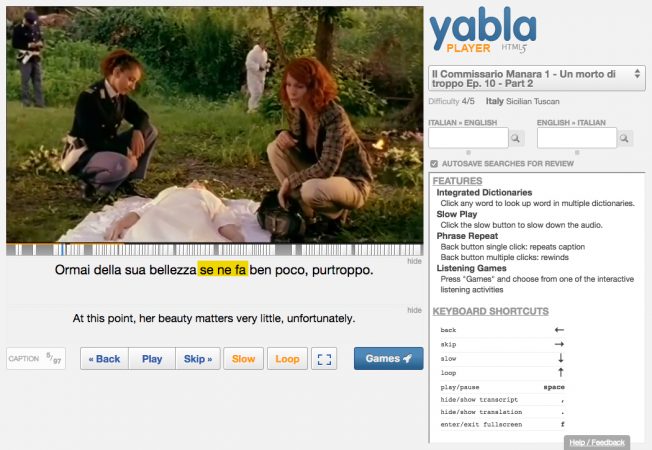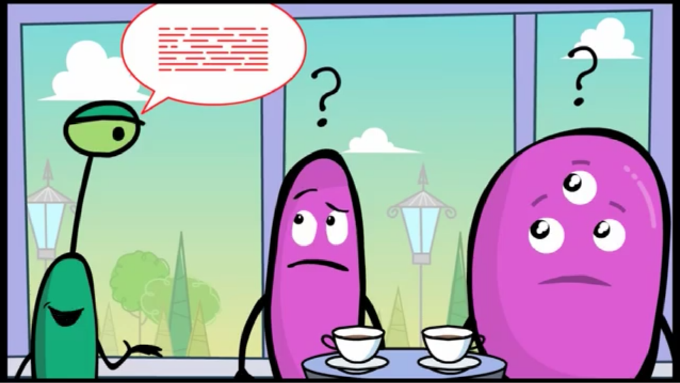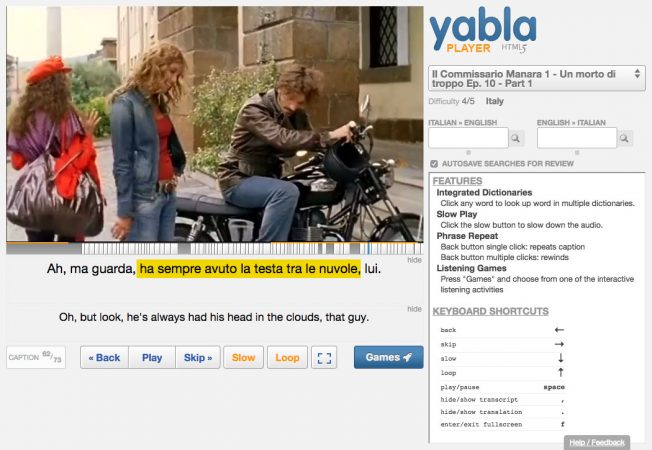farsene
Ok, this phrase is a bit more challenging than some of the others we’ve seen so far. For those of you who want to understand the grammar this will tax you a bit. I’m going to try to give you as literal a translation as possible so that you can grasp what you are saying. Eventually you will not need the translation anymore. In fact, the more you use the phrase, the less you will need to translate it. So make an effort to use it this week!
In our context this week, the verb farsene means to make use of. If we were to translate it literally it might look like this:
farsene
to make (use) (for) oneself of it
So now let’s turn to our phrase from Il Commissario Manara. Luca and Lara have just followed Brigadiere to a pond where they’ve found the body of a woman. Sardi comments on how beautiful the dead woman is. Ginevra, the medical examiner, then says:
Ormai della sua bellezza se ne fa ben poco, purtroppo.
At this point, her beauty matters very little to her, unfortunately.
Or, if we translate using our literal attempt:
Ormai, della sua bellezza se ne fa ben poco, purtroppo.
At this point, of her beauty she makes herself very little (use) of it, unfortunately.
Notice that the literal translation includes a bit of redundancy. But… and this is important… don’t get hung up on the literal translation! This is only so that wondering doesn’t drive you nuts. We don’t speak like this in English and try as you might to make it make sense in English, it won’t work. It’s best just to look at A LOT of examples and say them over and over to yourself as you try to experience the meaning. In that way, it will start to make sense to you. It really is a little like magic.
Most of the time you will see this expression used in questions where it might be translated as to want with (something).
For example:
Che cosa se ne fa di quello?
And what does he want with that?
(What use does he have for that?)
E che me ne faccio di un vestito?
And what do I want with a dress?
(What use do I have for a dress?)
Che me ne faccio di un sassofono?
What am I supposed to do with one saxophone?
(What use is a saxophone to me?)
Cosa se ne fa di quella maschera?
What use is that mask to him?
Che me ne faccio di un altro penny?
Why do I need another penny?
(What use is another penny to me?)
So right now, go pick something up and ask yourself: what do I want with this?
Che me ne faccio di…
Feel free to answer yourself (in Italian of course!)
When not a question, farsene often translates as what to do with it or what to make of it. It is often preceded by sapere which may or may not be translated. Here are some more examples:
Non so cosa farmene di tutto ciò
I don’t know what (use) to make of all this.
Non ho mai davvero saputo che farmene.
I never really knew what to do with it.
(I never really had any use for it.)
Non sapeva che farsene di quell’uomo.
He had no use for that man.
Non saprebbero che farsene di tutto questo.
They wouldn’t know what to do with all this.
There is also a very common idiom in Italian that uses farsene, but it’s meaning is completely idiomatic. It is:
farsene una ragione
to come to terms with it
But we’ll discuss that phrase next week!
How will you use this week’s Italian phrase? Tell us on Facebook!
Note: For those of you who just can’t stand not knowing why it’s ne and not ci – in this phrase you’ll notice that the thing being used is preceded by di.
della sua bellezza
of her beauty
When di is used with a verb (in this case fare) and you want to replace the object with a pronoun, you have to use ne. For a and a host of other prepositions, you use ci.
Wait… what language is THAT?
Yabla Italian is an excellent tool to help you develop an ear for spoken Italian. (I use Yabla personally to study three different languages.) With Yabla Italian you will have:
- verbatim subtitles in Italian
- access to English subtitles when you need them
- the ability to turn the subtitles off as you improve
- quizzes to gauge how well you’re doing
And… this is especially useful… you can slow the video down! Yes! We all know how fast the Italians talk. You know a lot of the words. If you just had a little more time to process them…. Well, now you do!
If you feel your Italian is good enough to watch without Italian (or English) subtitles, this episode of Il Commissario Manara is also available for free from RAI. You will need to fast forward to exactly 48 minutes for the start of Un morto di troppo.





